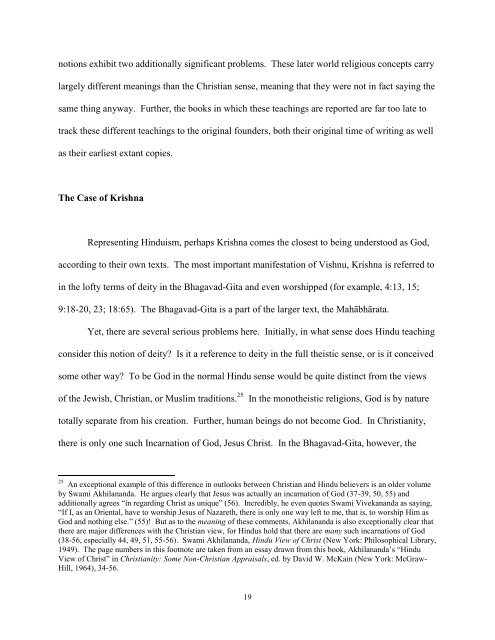Published by
299z7CN
299z7CN
You also want an ePaper? Increase the reach of your titles
YUMPU automatically turns print PDFs into web optimized ePapers that Google loves.
notions exhibit two additionally significant problems. These later world religious concepts carry<br />
largely different meanings than the Christian sense, meaning that they were not in fact saying the<br />
same thing anyway. Further, the books in which these teachings are reported are far too late to<br />
track these different teachings to the original founders, both their original time of writing as well<br />
as their earliest extant copies.<br />
The Case of Krishna<br />
Representing Hinduism, perhaps Krishna comes the closest to being understood as God,<br />
according to their own texts. The most important manifestation of Vishnu, Krishna is referred to<br />
in the lofty terms of deity in the Bhagavad-Gita and even worshipped (for example, 4:13, 15;<br />
9:18-20, 23; 18:65). The Bhagavad-Gita is a part of the larger text, the Mahābhārata.<br />
Yet, there are several serious problems here. Initially, in what sense does Hindu teaching<br />
consider this notion of deity? Is it a reference to deity in the full theistic sense, or is it conceived<br />
some other way? To be God in the normal Hindu sense would be quite distinct from the views<br />
of the Jewish, Christian, or Muslim traditions. 25<br />
In the monotheistic religions, God is <strong>by</strong> nature<br />
totally separate from his creation. Further, human beings do not become God. In Christianity,<br />
there is only one such Incarnation of God, Jesus Christ. In the Bhagavad-Gita, however, the<br />
25 An exceptional example of this difference in outlooks between Christian and Hindu believers is an older volume<br />
<strong>by</strong> Swami Akhilananda. He argues clearly that Jesus was actually an incarnation of God (37-39, 50, 55) and<br />
additionally agrees “in regarding Christ as unique” (56). Incredibly, he even quotes Swami Vivekananda as saying,<br />
“If I, as an Oriental, have to worship Jesus of Nazareth, there is only one way left to me, that is, to worship Him as<br />
God and nothing else.” (55)! But as to the meaning of these comments, Akhilananda is also exceptionally clear that<br />
there are major differences with the Christian view, for Hindus hold that there are many such incarnations of God<br />
(38-56, especially 44, 49, 51, 55-56). Swami Akhilananda, Hindu View of Christ (New York: Philosophical Library,<br />
1949). The page numbers in this footnote are taken from an essay drawn from this book, Akhilananda’s “Hindu<br />
View of Christ” in Christianity: Some Non-Christian Appraisals, ed. <strong>by</strong> David W. McKain (New York: McGraw-<br />
Hill, 1964), 34-56.<br />
19


